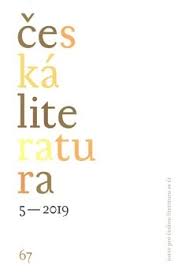Strukturalisté dělají marxismus
Structuralists doing Marxism
Author(s): Roman KandaSubject(s): Czech Literature
Published by: AV ČR - Akademie věd České republiky - Ústav pro českou literaturu
Keywords: history of literary studies; Marxism; Marxism-Leninism; structuralism; Mukařovský Jan; Vodička Felix
Summary/Abstract: The author of this study deals with the transition made by Jan Mukařovský (1891–1975) and Felix Vodička (1909–1974) from structuralism to Marxism and the forms of both theorists’ postwar and post-1948 thinking. It comes out against those expository stratagems that only perceive this issue to be a result of the post-1948 „ideologization“ of literary studies, or that trivialize the entire issue as an expression of „tactic playing“ at that time. The author of this study counters these expositions with the imperative of the historicization of theory, i.e. in this study Marxism is understoodto be a scholarly standpoint that did not lose its legitimacy (legitimacy is defined in this study as the outcome of a historically conditioned social process, and not as a normative category), while special attention is also paid to the semantics of the term„Marxism-Leninism“. In the case of Jan Mukařovský, the theoretical preconditions for acceptance of Marxism may approximately indicate the mid-1940s (1943–1945 to be precise), when the theorist first begins to deal with the issues surrounding the genesis of the work, the world view and the relationship between the individual and literary development. The assumption that literature is not a prime mover of the „noetic base“ and that in this respect a more crucial element is the production process, opens up the way to a basic reevaluation of the structuralist approach and its abandonment. After 1948 Mukařovský follows the role of an individual based on the example of Božena Němcová, but he did not treat the issue systematically on a Marxist basis. After 1948 the literary historian Felix Vodička abandons the structuralist idea of a creative individual as the bearer of literary trends — and in his post-1948 studies hereflects the „will“ of the individual and the social conditions for creation. This leads to a transformation in his analysis, which primarily takes account of the topical and thematic sphere to the detriment of the structural („formal“ or stylistic) elements in the work. This also leads to a transformation in the understanding of literature: the originally dominant aesthetic function is superseded by the cognitive and social critical function. Vodička’s Marxist reformulation of literary history culminates in what is known as role theory. However, this suffered from rigid teleologism, which manifested itself inter alia in the evaluation of literature from the standpoint of expost fabricated „objectives“ to be „accomplished“. In spite of the theoretical limits ofliterary-studies Marxism as conceived by Mukařovský and Vodička, this is an example of a new formulation of literary-studies knowledge and literature.
Journal: Česká literatura
- Issue Year: 67/2019
- Issue No: 5
- Page Range: 711-736
- Page Count: 26
- Language: Czech

